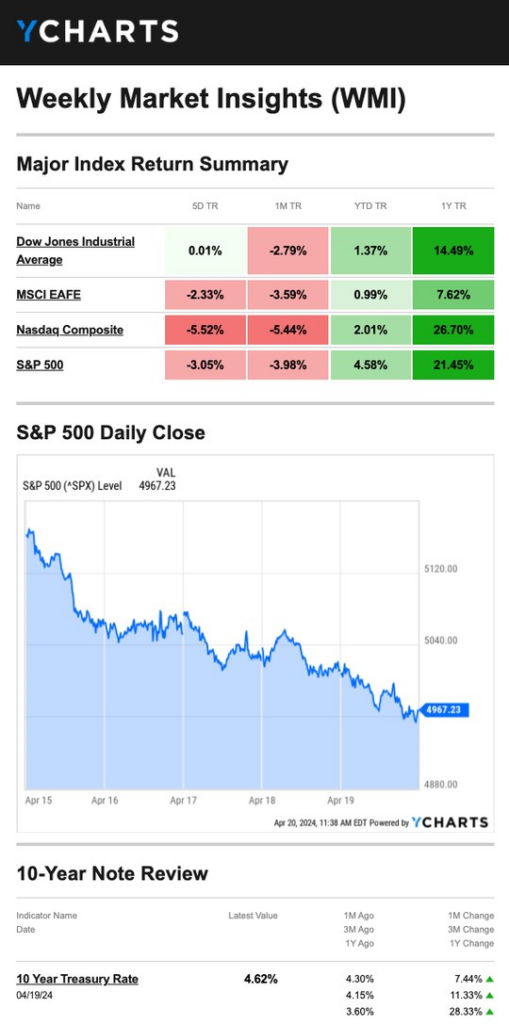
Stocks fell for a third straight week, as Fed Chair Jerome Powell’s mixed but upbeat message could not offset the anxiety caused by the Middle East conflict.
Stocks Retreat
Markets began the week rattled by further escalation in the Middle East over the weekend. A bit of good news punctuated an otherwise sour Monday, as a stronger-than-expected retail sales report showed consumers were spending despite rising inflation.1,2
On Tuesday, remarks from Fed Chair Jerome Powell indicated a shift in thinking—from being confident to not-so-confident about interest rate cuts in 2024. He said rates might need to stay higher until the Fed meets their 2% inflation target.3,4
On Friday, the markets saw further declines, but investors were somewhat reassured by the perception that Thursday’s retaliatory actions in the Middle East were restricted in scope.5


Source: YCharts.com, April 20, 2024. Weekly performance is measured from Monday, April 15, to Friday, April 19.
ROC 5 = the rate of change in the index for the previous 5 trading days.
TR = total return for the index, which includes any dividends as well as any other cash distributions during the period.
Treasury note yield is expressed in basis points.
Silver Linings
When stocks are in a downtrend, it’s important to keep perspective and realize that markets move in cycles. Here are a couple of bright spots from last week and perhaps some good news that may influence trading in the week ahead:
- While Chair Powell said last week that the Fed may keep rates higher for longer, he also said the Fed does not intend to raise rates for now.
- Despite inflation concerns, individuals were in a spending mood in March. Retail sales increased 0.7% for the month, more than twice the consensus forecast.
- “Earning season” picks up during the next four weeks. For the week ending April 26, more than 800 companies will give updates on business conditions in Q1.6
This Week: Key Economic Data
Tuesday: PMI Composite. New Home Sales.
Wednesday: EIA Petroleum Status Report. Durable Goods. Survey of Business Uncertainty.
Thursday: Gross Domestic Product (GDP). International Trade in Goods (Advance). Jobless Claims. Pending Home Sales.
Friday: Personal Income & Outlays. Consumer Sentiment.
Source: Investors Business Daily – Econoday economic calendar; April 18, 2024
The Econoday economic calendar lists upcoming U.S. economic data releases (including key economic indicators), Federal Reserve policy meetings, and speaking engagements of Federal Reserve officials. The content is developed from sources believed to be providing accurate information. The forecasts or forward-looking statements are based on assumptions and may not materialize. The forecasts also are subject to revision.

“Strive not to be a success, but rather to be of value” –
Albert Einstein



Can you Claim the Child Tax Credit for Other Dependents?
Even if you cannot claim the child tax credit, you may be able to claim the credit for other dependents under your care. The IRS issues a maximum of $500 for each dependent who meets specific conditions.
These conditions include the following:
- Dependents who are age 17 or older.
- Dependents who have individual taxpayer identification numbers.
- Dependent parents or other qualifying relatives supported by the taxpayer.
- Dependents living with the taxpayer who are not related to the taxpayer.
The credit begins to phase out when the taxpayer’s income exceeds $200,000. This phaseout begins for married couples filing a joint tax return at $400,000.
Taxpayers may be able to claim this credit if the following are applicable:
- They claim the person as a dependent on the taxpayer’s return.
- They cannot use the dependent to claim the child tax credit or additional child tax credit.
- The dependent is a U.S. citizen, national, or resident alien.
This dependent credit may also combine with the child and dependent care credit and the earned income credit.
*This information is not intended to be a substitute for specific, individualized tax advice. We suggest that you discuss your specific tax issues with a qualified tax professional.
Tip adapted from IRS.gov7

Channel Your Natural Beauty
What you put on your body is equally as important as what you put in your body; this is why more people are opting for natural skincare and beauty products. Natural ingredients are better for the environment and often gentler on your skin.
When seeking a natural beauty product, check its certifications. Most natural beauty products are certified organic or natural by outside organizations. As a bonus, they may also be vegan or cruelty-free. You should also consider shopping for products that are non-toxic, palm oil-free, and produced with ethical ingredient sourcing policies and environmentally friendly packaging.
Here are some of the most common natural ingredients to look for, depending on the product and your needs:
- Aloe vera
- Almond oil
- Shea butter
- Coconut oil
- Antioxidants such as pomegranate or orange extract
- Rosehip oil
- Sunflower seed oil
The list of powerful, effective, and safe natural beauty ingredients is constantly growing, and we are advancing toward a future of gentle, sustainable beauty products.
Tip adapted from Sustainable Jungle8
1. The Wall Street Journal, April 19, 2024
2. CNBC.com, April 15, 2024
3. The Wall Street Journal, April 16, 2024
4. CNBC.com, April 16, 2024
5. CNBC.com, April 19, 2024
6. MarketWatch, April 19, 2024
7. IRS.gov, October 23, 2023
8. Sustainable Jungle, January 23, 2023
Investing involves risks, and investment decisions should be based on your own goals, time horizon, and tolerance for risk. The return and principal value of investments will fluctuate as market conditions change. When sold, investments may be worth more or less than their original cost.
The forecasts or forward-looking statements are based on assumptions, may not materialize, and are subject to revision without notice.
The market indexes discussed are unmanaged, and generally, considered representative of their respective markets. Index performance is not indicative of the past performance of a particular investment. Indexes do not incur management fees, costs, and expenses. Individuals cannot directly invest in unmanaged indexes. Past performance does not guarantee future results.
The Dow Jones Industrial Average is an unmanaged index that is generally considered representative of large-capitalization companies on the U.S. stock market. Nasdaq Composite is an index of the common stocks and similar securities listed on the NASDAQ stock market and is considered a broad indicator of the performance of technology and growth companies. The MSCI EAFE Index was created by Morgan Stanley Capital International (MSCI) and serves as a benchmark of the performance of major international equity markets, as represented by 21 major MSCI indexes from Europe, Australia, and Southeast Asia. The S&P 500 Composite Index is an unmanaged group of securities that are considered to be representative of the stock market in general.
U.S. Treasury Notes are guaranteed by the federal government as to the timely payment of principal and interest. However, if you sell a Treasury Note prior to maturity, it may be worth more or less than the original price paid. Fixed income investments are subject to various risks including changes in interest rates, credit quality, inflation risk, market valuations, prepayments, corporate events, tax ramifications and other factors.
International investments carry additional risks, which include differences in financial reporting standards, currency exchange rates, political risks unique to a specific country, foreign taxes and regulations, and the potential for illiquid markets. These factors may result in greater share price volatility.
Please consult your financial professional for additional information.
This content is developed from sources believed to be providing accurate information. The information in this material is not intended as tax or legal advice. Please consult legal or tax professionals for specific information regarding your individual situation. This material was developed and produced by FMG Suite to provide information on a topic that may be of interest. FMG is not affiliated with the named representative, financial professional, Registered Investment Advisor, Broker-Dealer, nor state- or SEC-registered investment advisory firm. The opinions expressed and material provided are for general information, and they should not be considered a solicitation for the purchase or sale of any security.
Copyright 2024 FMG Suite.




